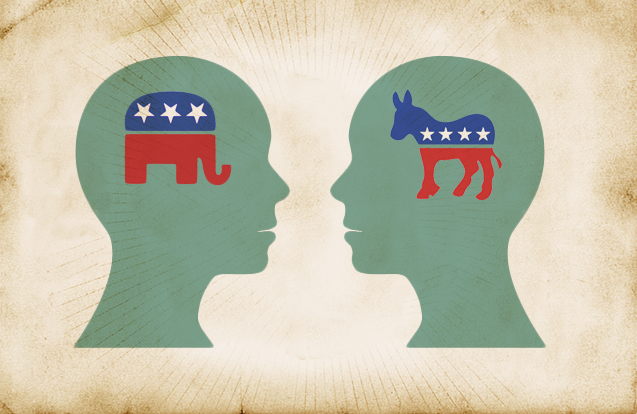 It must be tough to be a student affairs staff member, or anyone who works with young people, and have to keep your political opinions to yourself out of fear of alienating a segment of students you hope to reach with your advising skills.
It must be tough to be a student affairs staff member, or anyone who works with young people, and have to keep your political opinions to yourself out of fear of alienating a segment of students you hope to reach with your advising skills.Oh wait...it must not be that tough at all.
We are in the midst of a contentious presidential primary and I continue to be amazed at how many youth development professionals - including fraternity and sorority advisors - are wide open about their politics on social media sites like Facebook and Twitter. And it isn’t just “I think Trump is the right guy,” or “I'm pulling for Hillary.” It has been very intense at times.
It was long ago, but when I learned student development theory I took that dualism vs. relativism thing to heart. The college environment is one in which students are supported in their journey towards arriving at their own conclusions in life. When it comes to politics, however, many students affairs administrators seem to want to bring back dualistic thinking.
There shouldn’t be anything wrong being upfront about politics, right? The students who follow us on social media sites shouldn’t expect us to filter our beliefs and passions, right? If I've got a "Feel the Bern" sign in my cubicle or a "Cruz Crew" t-shirt on, it shouldn't matter to my ability to do my job, right?
Free speech is still one of the bedrocks of our nation. So is our ability to make choices and live with the consequences.
I have a fundamental belief that if you sign up to work with young people, from Kindergartners to college students, you have the responsibility to be approachable. Otherwise, you can’t do your job.
And so, we who work with youth should care most about the factors that either enhance our approachability or diminish it. The former we should amplify and the latter we should avoid.
 |
| Saw this posted many times. Usually followed by a political post. |
Some may wonder if my reticence to share politics out loud like that means I’m not as confident in my beliefs. My reticence is simply practical. I want the conservative evangelical pro-life Republican and the liberal environmentalist pro-choice Democrat to feel equally excited to walk through my office door and share their dreams with me.
I knew the political leanings of most of my favorite advisors, but I never felt that having different opinions made a difference in our relationships. However, we didn't have social media back then and my student affairs heroes weren't expressing their political opinions for all to see.
The vitriol and self-righteousness we see today from many student affairs professionals when it comes to politics is quite off-putting.
I'm not trying to tell any advisor what to do. My choice to not broadcast most of my personal beliefs about politics, religion, etc. has worked for me - and it is my choice. There have been many times I’ve wanted to post something on my Facebook page about sensitive topics, but I’ve held back. I share those thoughts with my friends and family instead.
To be fair, college students aren't sheep and they have minds of their own. Advisors can also choose to not be friends with students on social media sites (but can they really). And students aren't stupid. They know that the college environment tends to lean heavily in one direction already.
The point is, approachability matters. And it’s not something that emerges without intention and attention. Those of us in positions of leadership and influence should be driven by the answer to these fundamental questions: if I open the door, who is excited to come in and see me? And who isn't?
I track with this so much. The only piece I would add is when and how we consider diversity. Of course, there is a difference between #ImWithHer/#BaeRubio and, "get rid of the Muslims," however the latter has become a huge part of the rhetoric around political engagement. I think supporting equity, inclusion, and a multicultural America is part of our DNA as student affairs professionals. We definitely should consider how our political leanings impact all students, however not at the cost of further marginalizing groups that are getting slammed by certain parties. This might just be another post, in and of itself. Thanks for writing this, and opening the door, John!
ReplyDelete